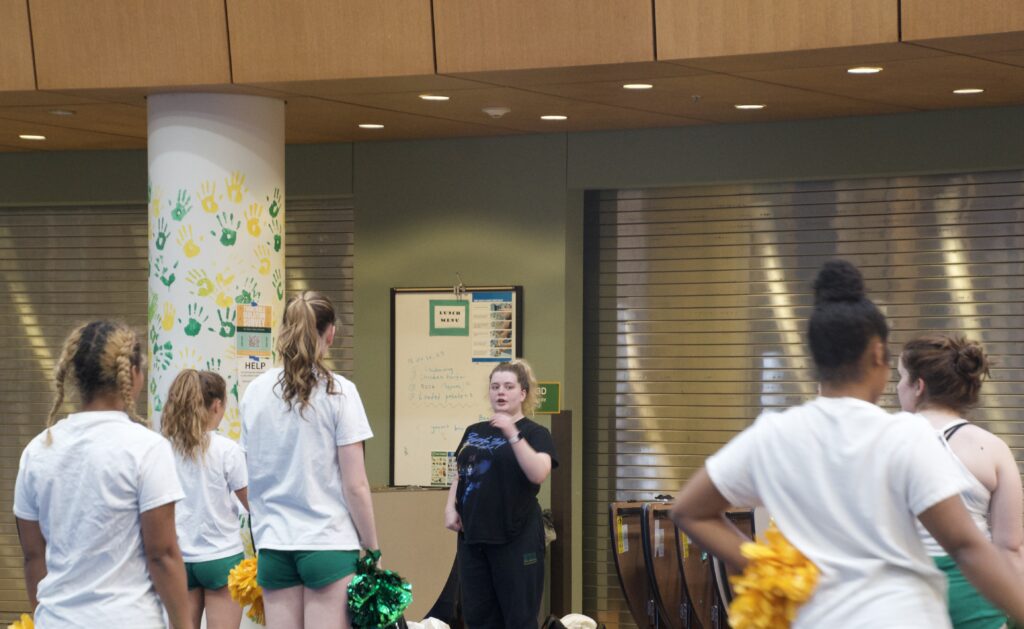
Opinion: Women coaches are critical to lead girls sports
Young girls in sports need to see themselves represented in their coaching staff. “One hundred percent of male athletes have had a male coaching role model during their athletic careers,” said author, professor, and director of The Tucker Center for Research on Women in Sport, Nicole M. LaVoi.
Data from Women’s Sports Foundation shows that at age 14, as girls are starting their freshman year of high school, they begin dropping out of sports at twice the rate of boys. According to the foundation, the factors influencing this mass dropout include safety and transportation issues, social stigmas and expectations, a decreased quality of experience, cost, and a lack of access to positive role models.
A student lacrosse player who requested anonymity said, “I play club for a woman coach and I think I had such a more positive experience because she can relate so much more to the athletic world, and she can relate so much more to those athletes and what they’re going through as a player.” The student continued, “Having a qualified female coach, coaching women growing up, is such a positive impact that’s just not directly represented.”
High rates of mental disorders in the athletic community are also important to consider. The British Journal of Sports Medicine noted that 48% of sampled elite athletes exhibited traits of diagnosable anxiety and depression. Additionally, disordered eating in female athletes is found to be about 6%-45% of that population, compared to 0%-19% of male athletes. Sixty percent of elite women athletes have reported experiencing body shaming pressures from a coach. Studies show a worsened mental well-being in athletes who are women, more so than their male counterparts.
Although these are issues experienced by society as a whole, it is more likely that athletes will seek help from within the athletic community, for fear that outsiders might not understand their concerns of confidentiality, lack of conversation or acceptance around mental health, and experience with societal stigmas.
LaVoi said, “Women coaches matter for a variety of reasons. Research shows that same sex role models positively influence self-perceptions. They challenge stereotypes about gender and leadership and offer diverse perspectives, insight and advice to their athletes.”
At Roosevelt, the number of sports teams that are coached by women are about equal to those coached by men. According to the school’s website, Roosevelt offers 24 sports, three of which are clubs, meaning they are not run by the school. Excluding the additional three coaching positions that are listed as “To Be Announced”, nine teams are coached by men, and nine teams are coached by a woman.
This student athlete continued, “what we’re not looking at is that a lot of the female coaches here right now are coaching multiple sports–our swim coach, yes she’s a female, but she’s also coaching the male and female teams. The cheer and dance coach, she’s a female, but she’s also double coaching cheer and dance year-round.” Although there is equality in the number of male and female coaches, the same cannot be said for the number of coaching opportunities, considering this double-booking of strictly women coaches. Hiring female coaches to cover multiple sports means that fewer women are hired overall.
These trends of inequality trickle into both college and professional women’s sports, where they can be viewed on a larger scale. Best Colleges states, “Currently, women hold about 25% of NCAA director and head coaching positions. And just 5.8% of head coaching positions for men’s teams are held by women, whereas 58.7% of head coaching positions for women’s teams are held by men.” For intercollegiate head coaching jobs, women hold only 1 in 5 positions.
When evaluating these statistics one must consider the societal stigmas and double–standards present for women in male-dominated professions. According to The Sport Journal, “ It has been demonstrated that women in leadership positions, such as sports coaching, tend to be rated as less effective in comparison to men, while athletes normally perceive female coaches as less capable than male coaches.”
A student athlete remarked, “I think it’s just historical, like [coaching has] always been looked at as a position for a male, and I don’t think that we’ve fully grown out of that in the coaching world. I think we’re starting to make progress in having more female coaches, and having females coach other women, which is so important. But I just think in the past, it’s always been a guys’ job, you’ve always been coached by a guy.”
Aside from all the advantages women coaches bring to the table, girls need to see women that look like them in the media, setting records and accomplishing feats of incredible grit and perseverance. Ensuring that female coaches are not a unique experience for athletes could be what inspires the Olympians of future generations.


